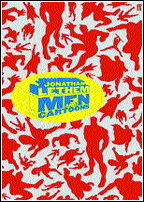






|
|

|
|

February 27, 2005
REVIEW: A comic book hero is no comic hero
 “I wanted to write about what we all want and can never have — the ability to rise above our lives, the ability to see our worlds from an impossibly privileged angle, the ability to rescue other people, or ourselves, from fate, the ability to slip between the seams of the world and disappear, to know what others are doing or saying when we’re not present, the ability to change identities,” said Jonathan Lethem of his superhero-preoccupied 2003 novel The Fortress of Solitude.
“I wanted to write about what we all want and can never have — the ability to rise above our lives, the ability to see our worlds from an impossibly privileged angle, the ability to rescue other people, or ourselves, from fate, the ability to slip between the seams of the world and disappear, to know what others are doing or saying when we’re not present, the ability to change identities,” said Jonathan Lethem of his superhero-preoccupied 2003 novel The Fortress of Solitude.
The nine short stories of Men and Cartoons continue this mission, largely revolving around men not quite grown up, not quite capable of overcoming their undignified pettier urges, not quite reconciled to the relinquishment of childhood.
Lethem’s points of agenda are all evident in the opening story “The vision”, whose narrator uses a party game to attempt to humiliate his urbane new neighbour Adam Cressner by revealing him as the schoolmate who used to paint his face with food colouring to pretend to be Marvel Comics’ super-powered Vision; instead he demeans only himself when met by Adam and his Amazonian girlfriend’s ingenuous acknowledgment of the embarrassing secret.
The narrator of “Super Goat Man” similarly shames himself at a dinner party trying to degrade the titular character, who had retired from his underwhelming comic-book adventures to become a hippie-ish politics professor. The curious superhero’s happy assimilation into civilian life, as with Adam Cressner’s, somehow invokes helpless feelings of sexual inferiority and discomfited competitiveness in the narrators, as if to scorn comics is a fast track to being socially inept.
Elsewhere in the collection Letham’s fixation with comic books is less overt, but a persistent influence nonetheless, not least in his writing style. The direct storytelling of graphic novels and comics often obviates subtext, and likewise Lethem tends to show rather than suggest; his blunt prose is often refreshing. However his shortcomings are revealed by the final story “The national anthem”, in the form of a letter by a middle-aged man to his estranged childhood friend mulling over the breach which somehow ended their seemingly indissoluble relationship at college. While the inexorable divergence of the friends is all too familiar, the epistolary structure is not substantiated by an apt writing style, and the attempt at a more serious, less vulnerable tone makes the narrator seem pompous and crass.
Fortunately, the rest of the stories are frequently punctuated by remarkable phrases of straightforward elegance. Eloquently Lethem observes that his hero “raised his pen like Death’s sickle and plunged those dreamily ineffectual worlds into ruin” in the magnificently named “The dystopianist, thinking of his rival, is interrupted by a knock on the door”, wherein the dystopianist of the title is the foremost writer of fantastical doom-laden stories in a culture awash with cheering utopianist tales in magazines such as Heartening and Encouraging.
The dystopianist’s capacity for catastrophic innovation deserts him when his childhood fellow-in-comics re-emerges as the Dire Utopianist, whose superficially uplifting stories are so subversively devastating that their readers are unwittingly plunged into despair and the dystopianist seems a mere tin-pot cataclysm-peddler in comparison. This idea is beguiling enough without the further addition of the dystopianist’s inventions starting to come true; indeed, Lethem seems to have far more complex ideas than these short stories can sustain, and they seem to work best when most simplified.
Lethem unquestionably has an intriguing imagination for science fiction, but is even more interesting when simply probing human psychology. — Dawn/Observer News Service
Men and Cartoons
By Jonathan Lethem
Faber & Faber
ISBN 0571224504224pp. £10.99
|
|
|